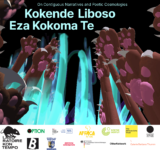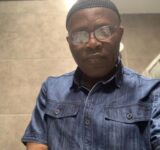TJ Benson
Following Ake wherever Ake goes, TJ Benson chronicles snippets of the 2017 edition of one of the biggest literary festivals in Africa.
There is a three-second flaw in Fela’s “O.D.O.O. (Overtaking don overtake overtake)” that is dear to me. I encountered it just when my bus swerved into Abeokuta. I love the flaw because it makes the moment of the music real. It was a wonderful coincidence that, at the entry to the city, his song would come up, because, after I left Yoruba land in February, songs from Fela and Beautiful Nubia carried warm Abeokuta nights and the mountains wearing confetti-colored pre-colonial buildings of Ibadan with me. Close to the final bus stop, I passed a poster with four men cheerily carrying a coffin; the text was advertising Royal Funeral Services. Before I could figure out if they also added the task of professional criers, the next poster, still bearing coffin-laden men, announced ‘Remember Your Six Feet.’
When Hymar invited me to join him for breakfast at an amala joint the next morning, I was worried because I don’t have a good history with oil and pepper in local Yoruba cuisine. But a friend is a friend, so I ambled after him down the road beside the Cultural Center until he stopped to cross. Even then, I didn’t come up with an excuse to run away. I am a loyal friend, you know. In the small room, I decided I would eat their bread and ewa a goyin. For safety, at the first spoon of the ewa a goyin, so many things rose inside me in Yoruba that I didn’t have words for. I finally understood why Lagosians on my Facebook friend list were crazy about it. I turned to Hymar and yelled “makes senseee!” and he laughed.
The opening ceremony for the fifth edition of the Ake Arts and Book Festival started with an apology for the lateness in the commencement by Arit Okpo. Apparently, there had been three accidents on the Lagos-Ibadan expressway holding up some important guests in traffic. She was so pleasant we didn’t notice she had forgotten to introduce herself. Celeste, the first artist to open the festival in the concert the previous night, performed the national anthem and, once representatives of sponsoring companies started giving speeches, I lost track of things. Two organizations wanted my photos from the festival and I was blogging for the festival website. It was in this dissociation that I would experience most of the festival, jotting down who said what and quickly whipping out my camera to capture as many important moments as possible.
It was in this dissociation that I would experience most of the festival, jotting down who said what and quickly whipping out my camera to capture as many important moments as possible.
One moment that made me drop my camera was when, without warning, Yvonne Chioke, Managing Director of Vlisco, invited Adebola Rayo to the stage to accept an award for her work on mental health. I jumped up to start clapping before I knew what I was doing.
In-between events, I managed to reconnect with friends I had not seen in the past year and friends from social media I was meeting for the first time. Onyeka Nwelue walked in donning a blue blazer and joined Oris, Otosirieze, and I in a conversation on consent. Oris asked why I didn’t seek his permission before writing him into a compromising situation in my 2016 Ake memoir and Otosirieze said I didn’t need to, as long as it happened.
“Ahn ahn, I thought you were in which country?” I asked after exchanging pleasantries. “Just yesterday, I saw it on Instagram yesterday.”
“Ah I flew into Lagos yesterday,” Onyeka replied.
Another moment was seeing Ayobami Adebayo walk past my media office to the bookstand as ordinarily as a bird perching on a branch. I’d vowed to stop taking Baileys when her book, Stay With Me, didn’t win the Baileys Fiction Prize it had been shortlisted for. I’d read a friend’s copy and was patiently waiting for my UK copy to get to Nigeria, but when she animated the Yoruba voice of her mother-in-law character, I smiled, shook my head, and raced to the Ake bookstore for the Nigerian edition by Ouida Books.
During the festival, I had my flask filled with Power Irish Cream and attended as many panels and book chats as I could. If I was attending as an ordinary guest or visitor, I would have found some of them boring, but the closer the topics or books were to the This F- Word theme, the more interesting they were for me. In the Silencing the Silence session, anchored by Olutimehin Adegbeye, the society was put up on the stand and asked to produce the phantom rapist: “Every man says ‘not me’. Who is this rapist then?” Jude Kelly asked. “He must be very busy.”
What was the spirit of this year’s Ake? I was asked this in an interview recently and, without hesitating, I had replied: “Who, you mean, and that’s Lola Shoneyin. Tireless omnipresent Lola shooing people off to panels, asking random people if they’d had lunch. She cut her hair recently and dyed it yellow, and I think it has something to do with the This F-Word theme.”
I was looking forward to meeting my friends from Cameroon and South of Nigeria, relaxing into the panels —especially the ones anchored or participated in by Adebola Rayo—, spending long hours in the hotel room unwinding from the year-long war I had fought with stunted electricity supply, uncomfortable housing, and mental inertia to complete my nine-year novel and, of course, Lola’s yellow hair. She had tweeted a photo of it months before the festival and I thought “ghen-ghen, F-Word’s gonna be lit!” On the first day, Ik Nwaogu, who worked in the media department, saw me starting this document and asked, “But how do we write about Lola’s hair?”
The Lagos to Limbe Crossroads panel discussion (with Bakwa Magazine, Saraba Magazine, Goethe-Institut, and 8 writers) was also interesting and had high attendance. Howard Meh-Buh from Cameroon read with his voice high, tinged with charisma, and Nigeria’s Socrates Mbamalu read with his voice calm, and melancholic, and both silenced the crowd. They were my favorites. There was a bit of hilarity when Adam Adeosun shuffled to Howard and back to get his story and when, in answer to a question from the audience on how he managed to preserve the security of the people he talked about in his non-fiction, Raoul Djimeli replied: “Ah me I don’t have that problem; you see, in my family, I am the only one who writes and reads English. So I can write anything and my father would never know.”
I was star-struck during Ake. I would see Ayobami and start stammering. I kept dodging Emmanuel Iduma even though we had been talking about my short story collection for a whole year. When meeting him was inevitable, at the Saraba ‘Transitions’ launch where I was to read my piece, I hid behind a steely “It’s good to meet you.”

When he called me up to read, I said hi and encouraged everyone to sit down on the carpet with me, but someone said something about bedbugs and I said okay and sat down and began to read. A photo of me sitting on the ground reading from my story would trend on twitter under #AkeFest17 hours later, and a former university school mate would say I looked like a babalawo the people had come to beg for rain. Ayobami read from Irenosen Okojie and Emmanuel opened the floor for questions and answers. Dami Ajayi answered most of them, and thank God he did, because most of them were redundant! This I would say is my problem with the festival, and it is no fault of the program designers’ per se; it’s the visitors and guests. Next year people would still ask if the writers wrote better in the morning or had to eat chocolate first. Someone asked how to get published and I rolled my eyes into my skull. During the Limbe to Lagos panel held earlier, someone had asked how accurately the writers portrayed sex in non-fiction, and Sada’s answer, though shared privately, was my favorite: “If you can write sex well as fiction then you should be able to write it better in non-fiction.”
“How did you start writing?” asked Geoff Ryman sometime during the festival, under a tree beside the hall where an Indian man had practiced meditation last year, and I didn’t roll my eyes at all. He was interviewing me and, well, the question can be redundant… until it is directed to you. Tolu Daniel had talked to Geoff about my writing so hard that Geoff said to me: “Whatever you pay him, double it; he is advertising you so well.”
I had, in my free time, run into Roy, Spirit-Being, Joshua, and Victor —participants in my recent creative writing workshop— and it was lovely talking to them. I was meeting Victor and Spirit-Being for the first time and I would learn that her non-fiction piece had been published in the new Ake Review. In a corner, outside the party hall, on the last night, two girls were having a serious conversation on filmmaking. “I’ve already gotten my equipment,” one was saying. “After Ake, I’d get my shit together and start.”
“Yes, me too. Been editing for a while but I am going to take it more seriously.”
And I beamed thinking this was the F-Word! I turned to the girls: “This is so beautiful, you guys are so beautiful,” and they giggled, and I left. People were loitering about when they should have been in Ama Ata Aidoo’s interview. She occupied space with the authority of one who has worked to occupy it, yet she was available throughout the festival. I don’t know how Lola Shoneyin does it. Last year it was the same; people were just running into Ngugi and taking selfies with him. As Molara Wood interviewed her, she unspooled the strands of memory without closing her eyes to recall anything, as if the eighties and nineties she spoke of were happening in front of us. And she made it happen in front of us. When someone about to ask a question began with “Mummy”, she retorted “I am not your mother, I am Ama Ata Aidoo”, and the hall roared in laughter.
There was a bit of hilarity when Adam Adeosun shuffled to Howard and back to get his story and when, in answer to a question from the audience on how he managed to preserve the security of the people he talked about in his non-fiction, Raoul Djimeli replied: “Ah me I don’t have that problem; you see, in my family, I am the only one who writes and reads English. So I can write anything and my father would never know.”
In the dance hall, after pulling myself away from people who wanted me to dance, I found Oris standing by a pillar and recalled our conversation on consent. I walked up to him and mimicked his serious surveyor-of-the-crowd look, cocked my head to his side and asked: “So, any commentary on the behavior of these-”
I was interrupted by something like “if you don’t get out of here.” I can’t recall, but we laughed, and I left. Lots of people didn’t come for the party or perhaps they left early. Where was Nkiacha? He and Sada Malumfashi had won Sylt writing residencies in Germany within the framework of the Lagos-Limbe Exchange Project. Representing Cameroon, Nkiacha had worn a white shirt and tied an angle-length tribal waistcloth to climb the stage and accept the award on the day of the opening ceremony; I had expected to see him busting some native moves. What tribe from Cameroon was he? What would he work on in Germany? I didn’t have the time to get close to him or make any new friends because of my blogging and photography work. I was still shuffling between events on the afternoon of the last day, capturing moments, when I saw a band of Ake visitors marching from the hall to the gate. When I brought the camera down, I realized they were my friends.
“Ahn-Ahn see Adeola, see Romeo, Dzekashu, Mimi where una dey go?”
“Palmy!”
“Palm wine joint.”
“Tolu Daniel is taking us there,” said Dzekashu. “He is in front.”
“Wait for me, I am coming!”
“Aren’t you supposed to be working, Mister TJ Benson?” asked Mimi.
“Ah this is part of the work,” I replied, taking off my “blogger” ID. “I have to follow Ake wherever Ake goes.”






The way TJ beautifully chronicled the events of Ake2017 revived the memories😂
I’m literally reliving them right now😍